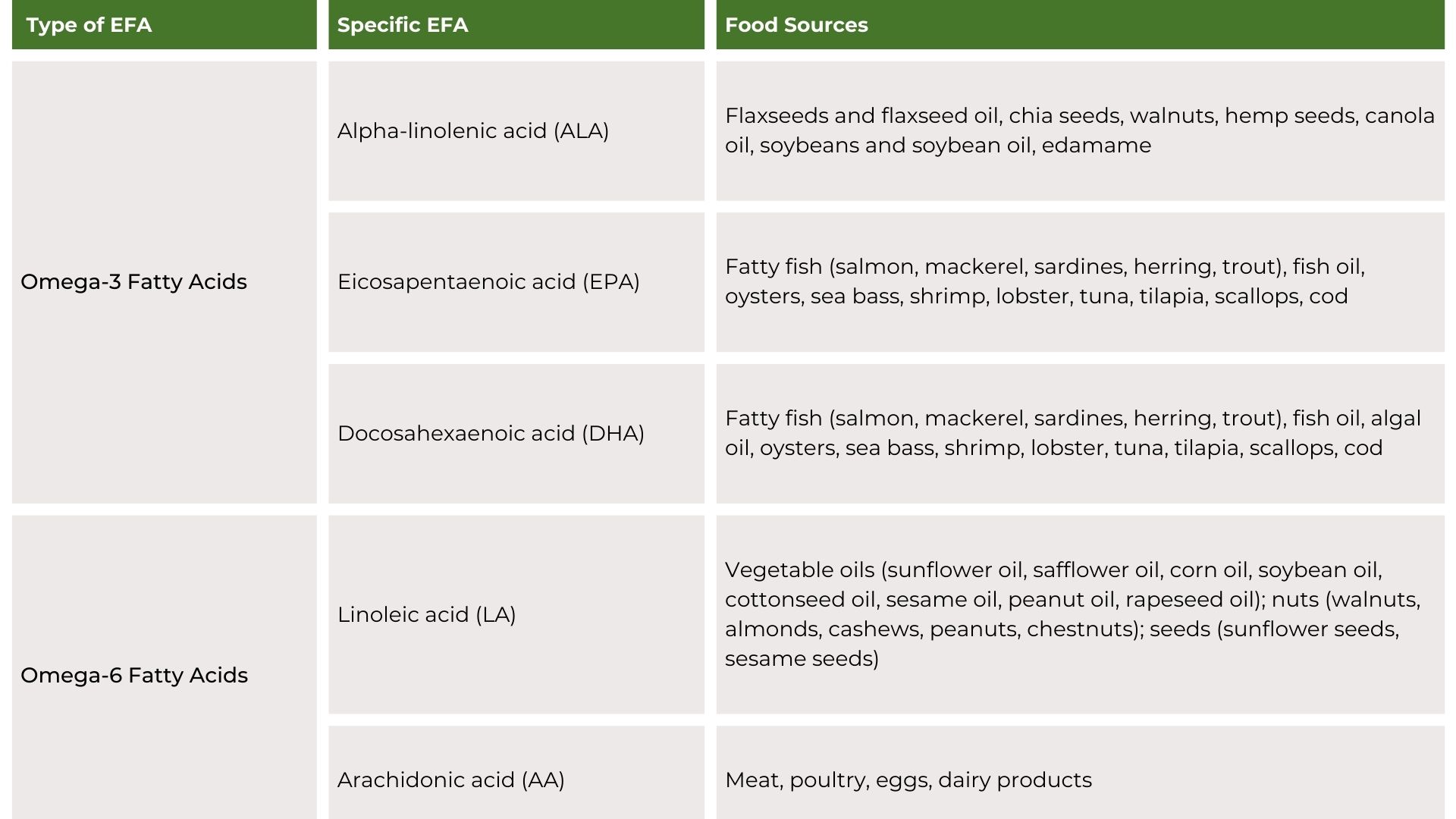Essential fatty acids (EFAs) are important for children, especially for healthy development. Children are born with immature immune systems, which gradually develop and strengthen as they age. During this period of growth, obtaining adequate EFAs is crucial to support the maturation and function of the immune system. EFAs play a role in regulating inflammation, supporting the development and function of immune cells, and enhancing the body's ability to fight off infections and diseases. Ensuring that children receive enough EFAs through a balanced diet or supplementation can significantly bolster their immune defences, aiding in the smooth transition from a vulnerable infancy to a robust and resilient childhood.1,2
WHAT ARE EFAS?
EFAs are polyunsaturated fats found in different foods that the body requires for proper growth, development, and function. Areas of the body that rely on EFAs include:
- Brain
- Heart
- Skin
- Joints
- Immune system
These fats are essential because the body cannot produce them independently, so they must be obtained through diet.3,4

The two primary categories of EFAs are omega-3 and omega-6 fatty acids. Omega-3s include alpha-linolenic acid (ALA), eicosapentaenoic acid (EPA), and docosahexaenoic acid (DHA), while omega-6s include linoleic acid (LA) and arachidonic acid (AA). The table above provides an overview of the EFAs and their common dietary sources.3,5
BENEFITS FOR CHILDREN'S IMMUNITY
Omega-3 and omega-6 fatty acids are involved in the production of eicosanoids, which help regulate the body's immune response.1,3 Omega-3 fatty acids are particularly crucial for modulating the immune response due to their anti-inflammatory properties.6 They help reduce chronic inflammation, which is linked to numerous health issues, including autoimmune diseases, allergies, and asthma.7
EFAs also contribute to the proper functioning of immune cells, such as neutrophils, monocytes, macrophages, dendritic cells, T-cells, and B-cells, which are essential for identifying and combating pathogens. Studies have also shown that children with adequate levels of omega-3s in their diet tend to have a lower incidence of respiratory illnesses and allergic conditions.1,8
OMEGA-6: OMEGA-3 RATIOS
Omega-6 and omega-3 fatty acids both play essential roles in growth and development, but they have opposing effects on inflammation, which can be particularly harmful to immune function. Omega-6 fatty acids promote inflammation if consumed in excess, while omega-3 fatty acids have anti-inflammatory properties that help to regulate and resolve it.1
Currently, the typical Western diet is disproportionately high in omega-6s, with an estimated omega-6 to omega-3 ratio of 15–20:1.7,9 This is primarily due to the overconsumption of linoleic acid from industrial omega-6-rich seed oils such as soybean, corn, safflower, sunflower, and cottonseed oil. These oils are commonly found in a variety of processed and packaged foods due to their low cost and long shelf life.10 Examples of foods that contain these oils are commercially prepared:
- Baked goods
- Chips
- Crackers
- Margarine
- Salad dressings
- Ready-made meals
In addition, the typical Western diet has a low intake of omega-3-rich sources such as seafood, which also contributes to the high omega-6 to omega-3 ratio.9

Before 100 years ago, humans consumed a diet with an omega-6 to omega-3 ratio of around 1:1; currently, there’s no consensus on the ideal omega-6 to omega-3 ratio, but some studies find a ratio of 5:1 or less beneficial for various health outcomes.9 Regardless of the specific ratio, experts agree that reducing omega-6 in the typical Western diet is crucial for long-term health and well-being, particularly for children who are still growing and developing.7,9 This can be accomplished by limiting your child’s consumption of processed and packaged foods and including a dietary or supplement source of omega-3 fatty acids into their diet every week.
PRACTICAL TIPS
- Incorporate fish into meals: Aim to serve fatty fish at least twice a week. Try kid-friendly recipes like fish tacos or salmon patties. If this frequency is not possible, consider supplementing with an omega-3 fish oil.
- Add nuts and seeds: Sprinkle flaxseeds or chia seeds on cereals, yogurt, or smoothies. Offer walnuts as a snack or add them to baked goods.
- Choose fortified foods: Look for foods fortified with omega-3s, such as certain brands of eggs, milk, and yogurt.
- Read food labels: Read ingredients in packaged foods and choose an alternative to those containing omega-6 seed oils.
- Prepare homemade meals: Whenever possible, cook meals at home rather than buying ready-made or frozen meals to decrease consumption of omega-6 fatty acids. In addition, aim to use olive, avocado, or coconut oil at home.
SUPPLEMENTATION
While obtaining EFAs from a balanced diet is ideal, supplementation can ensure children receive adequate amounts—particularly for choosy eaters or those with dietary restrictions. Omega-3 supplements, such as fish oil or algal oil, are commonly used to boost intake of these important fats. Parents should focus on omega-3 supplements only and avoid omega-6 as the typical Western diet already contains an abundance of omega-6 fatty acids.

When selecting a fish oil supplement, it’s crucial to choose high-quality products that are free from contaminants. Look for products certified by the International Fish Oil Standards (IFOS) program. IFOS certification ensures that the fish oil has been tested for purity, potency, and freshness, providing peace of mind that the supplement is safe and of high quality. Products that have this certification can be found on their website: certifications.nutrasource.ca.
Prior to starting any supplementation with your child, it’s important to consult a healthcare provider to tailor the approach to your child's specific needs and to avoid potential interactions with other nutrients or medications.
THE BOTTOM LINE
Essential fatty acids are a crucial component of a child's diet, playing a vital role in supporting their immune system. Ensuring a balanced intake of omega-3 and omega-6 fatty acids can make a significant difference in a child's ability to fend off infections, manage inflammatory conditions, and reduce the risk of autoimmune diseases and allergies. Although the typical Western diet is already high in omega-6s, parents shouldn’t avoid whole food sources such as nuts and seeds; rather, they should limit their children’s intake of processed and packaged foods. Encouraging a varied whole-foods diet that contains food sources of EFAs will not only support your child’s immune health, but their overall health and well-being too.
References
- Miles EA, Childs CE, Calder PC. Long-chain polyunsaturated fatty acids (LCPUFAs) and the developing immune system: a narrative review. Nutrients. 2021;13(1):247.
- Noor S, Piscopo S, Gasmi A. Nutrients interaction with the immune system. Arch Razi Inst. 2021;76(6):1579-1588.
- Kaur N, Chugh V, Gupta AK. Essential fatty acids as functional components of foods- a review. J Food Sci Technol. 2014;51(10):2289-2303.
- Simopoulos AP. Essential fatty acids in health and chronic disease. Am J Clin Nutr. 1999;70(3 Suppl):560S-569S.
- National Institutes of Health. Omega-3 Fatty Acids, Fact Sheet for Health Professionals. https://ods.od.nih.gov/factsheets/Omega3FattyAcids-HealthProfessional/
- Gutiérrez S, Svahn SL, Johansson ME. Effects of omega-3 fatty acids on immune cells. Int J Mol Sci. 2019;20(20):5028.
- DiNicolantonio JJ, O’Keefe J. The importance of maintaining a low omega-6/omega-3 ratio for reducing the risk of autoimmune diseases, asthma, and allergies. Mo Med. 2021;118(5):453-459.
- Hageman JHJ, Hooyenga P, Diersen-Schade DA, Scalabrin DMF, Wichers HJ, Birch EE. The impact of dietary long-chain polyunsaturated fatty acids on respiratory illness in infants and children. Curr Allergy Asthma Rep. 2012;12(6):564-573.
- Simopoulos AP. The importance of the ratio of omega-6/omega-3 essential fatty acids. Biomed Pharmacother. 2002;56(8):365-379.
- Mariamenatu AH, Abdu EM. Overconsumption of omega-6 polyunsaturated fatty acids (PUFAs) versus deficiency of omega-3 PUFAs in modern-day diets: the disturbing factor for their “balanced antagonistic metabolic functions” in the human body. J Lipids. 2021;2021:8848161.






